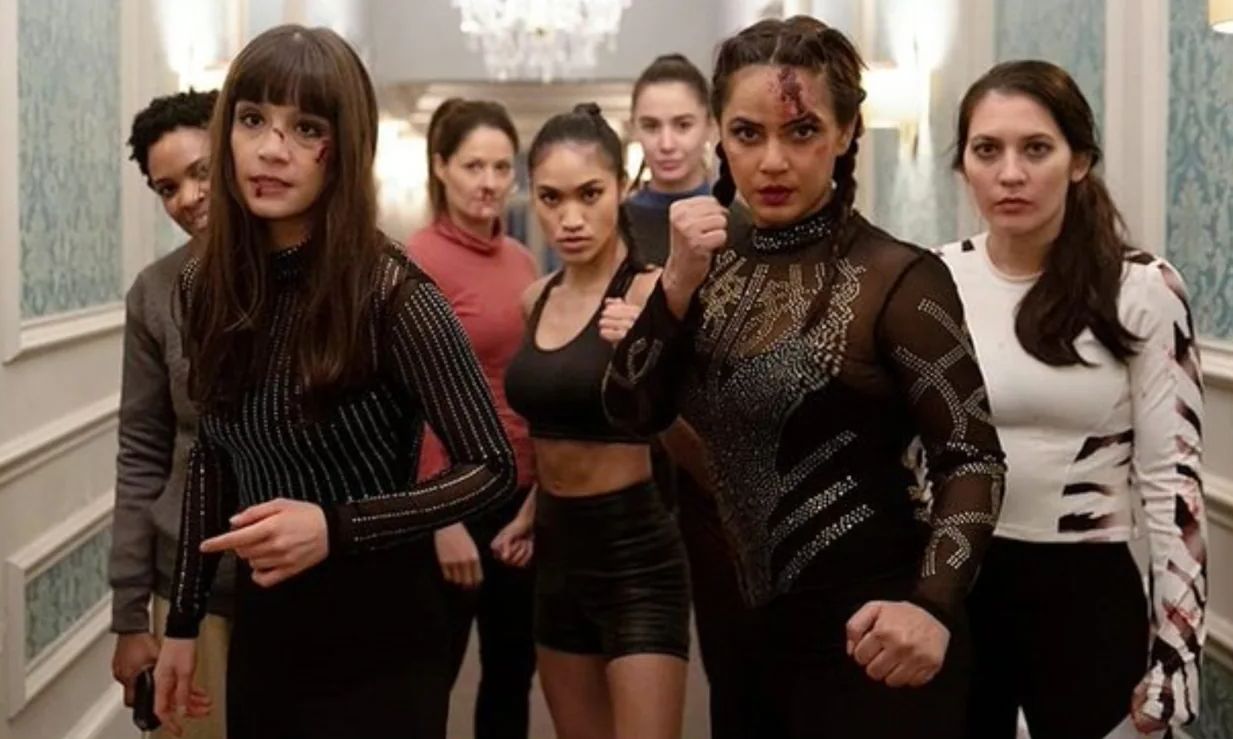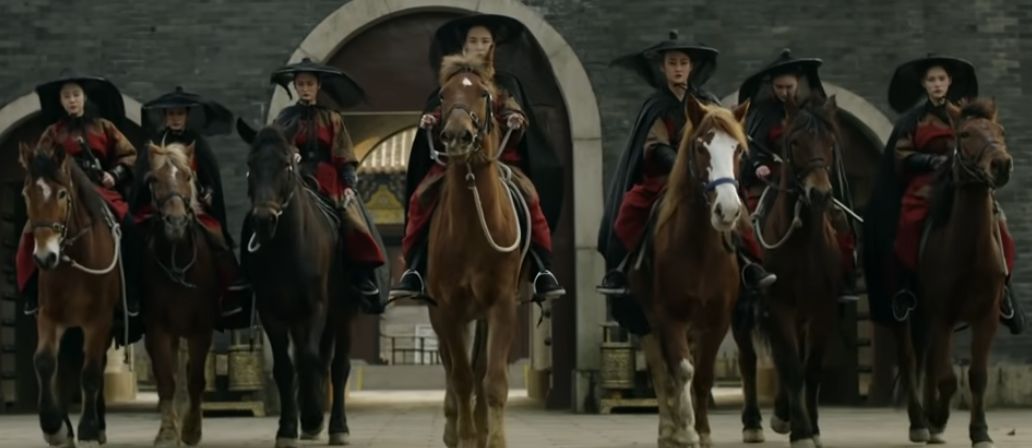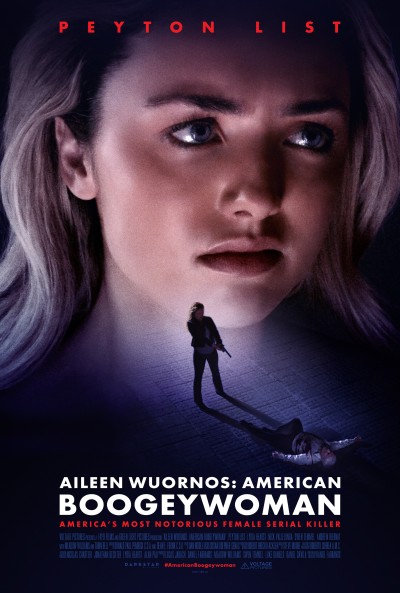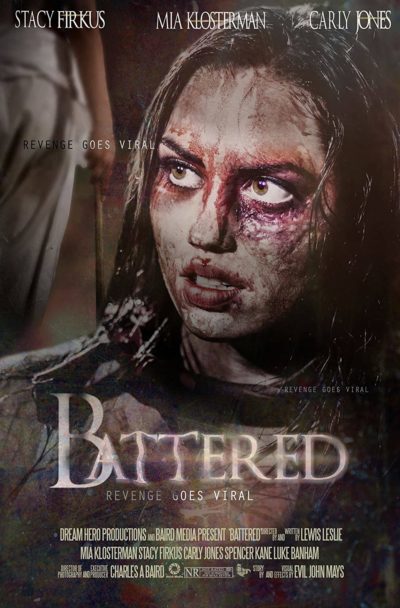★★★½
“The women are revolting!”
The “underground fighting” subgenre is among the most macho of action films, so it’s interesting that this entry doesn’t just feature a female protagonist. It’s also written and directed by women, with the lead villain also from that gender. It’s a particularly novel twist, considering the previous three installments in the Never Back Down franchise were, by most accounts, competent yet entirely generic, male-dominated movies. I say “by most accounts,” since I’ll confess to not having seen them. This is both a positive and a negative, I think. It means I can go into this with no preconceptions or expectations. On the other hand, it also means I can’t compare it to the rest of the series.
The latter is perhaps less important since it seems to be a sequel in name only, without any characters or story-line carrying forward. The heroine is Anya (Popica), a Chechen refugee now living in London with her brother, Aslan (Bastow), who takes part in those underground fights. After failing to throw a fight, he finds himself thirty grand in debt to some very nasty people. But Anya, who’s no novice with her own fists, gets an offer from swanky promoter Mariah (Johnston) to help pay off the arrears with a trip to Italy. Naturally, it turns out to be a front for “fight trafficking”, with the female participants held against their will, and shipped off to Albanian brothels, when they can no longer battle for the amusement of rich patrons. The title tells you the rest of the plot.
 Madison isn’t without an action pedigree, having directed rather good short, The Gate, starring site favourite Amy Johnston. That’s currently being shopped around to become a feature; fingers crossed that happens. In the meantime, this would appear to match its predecessors in being competent, yet entirely generic. Everything unfolds exactly as you would expect, if you’re at all familiar with this kind of thing. It’s the kind of film where you can pop into the kitchen for 10 minutes without pausing it, make a sandwich and a cup of coffee, and return, safe in the knowledge that you’ll still be able to follow the plot perfectly well. I can neither confirm nor deny having done exactly that.
Madison isn’t without an action pedigree, having directed rather good short, The Gate, starring site favourite Amy Johnston. That’s currently being shopped around to become a feature; fingers crossed that happens. In the meantime, this would appear to match its predecessors in being competent, yet entirely generic. Everything unfolds exactly as you would expect, if you’re at all familiar with this kind of thing. It’s the kind of film where you can pop into the kitchen for 10 minutes without pausing it, make a sandwich and a cup of coffee, and return, safe in the knowledge that you’ll still be able to follow the plot perfectly well. I can neither confirm nor deny having done exactly that.
While predictable, it’s never dull though. Popica doesn’t appear to have any particular martial arts background, yet is decent enough to pass muster (even if you wonder what someone like Amy Johnston might have done in the part). There’s a laudable and complete lack of romance here, just the sibling relationship. I could probably have used some more action, even if the quality of what there is, is decent. I particularly liked the fate meted out to the chief guard. The size issue, inevitably present in mixed-gender fights, is overcome by having him held down by two women in a bath, while a third shanks him very enthusiastically. In comparison, Ghislaine Maxwell Mariah seems to get off easy, just when I was looking forward to her getting her just deserts. Still, solid enough to leave me anticipating what The Gate feature might be like.
Dir: Kellie Madison
Star: Olivia Popica, Tommy Bastow, Brooke Johnston, Nitu Chandra





 With the aid of her helicopter pilot sister-in-law, Sofia goes to the rig after an official rescue mission is rejected. Getting Stian out is just the start. For the oblivious authorities now plan to deal with the massive pollution threat by setting it on fire. [Hey, it is called The Burning Sea after all…] And that may not be the end of their problems either. It is relatively restrained on the destruction: despite that title, the inflammable ocean only occupies a few minutes of screen time. However, it feels considerably more grounded than most of its kind, with a ‘hard science’ basis which gives proceedings plausibility. Obvious disclaimer: I am not a geologist. However, factual accuracy aside, I respect the effort.
With the aid of her helicopter pilot sister-in-law, Sofia goes to the rig after an official rescue mission is rejected. Getting Stian out is just the start. For the oblivious authorities now plan to deal with the massive pollution threat by setting it on fire. [Hey, it is called The Burning Sea after all…] And that may not be the end of their problems either. It is relatively restrained on the destruction: despite that title, the inflammable ocean only occupies a few minutes of screen time. However, it feels considerably more grounded than most of its kind, with a ‘hard science’ basis which gives proceedings plausibility. Obvious disclaimer: I am not a geologist. However, factual accuracy aside, I respect the effort.  This is set in the everyday world – but with one major tweak. Witchcraft exists, and has been outlawed in the United States by the 11th amendment. Now, government agents from the BWI seek out witches, using tried and true methods from the middle ages (the “sink test” is exactly what it sounds like), and punish those found or suspected to be practicing witchcraft. But those opposed to this have set up an “underground railroad” to smuggle the targets over the boarder to Mexico. Teenage girl Claire (Adlon) is part of one such family, courtesy of her mom Martha (Elizabeth Mitchell); Dad is out of the picture. Claire is rather ambivalent about their activism, since she just wants to fit in at school. But the arrival of Fiona (Cowen) and her little sister, siblings whose mother was burned at the stake, forces Claire out of her professed neutrality,. Especially as the investigation of the unrelenting BWI Agent Hawthorne (Camargo) gets closer to home.
This is set in the everyday world – but with one major tweak. Witchcraft exists, and has been outlawed in the United States by the 11th amendment. Now, government agents from the BWI seek out witches, using tried and true methods from the middle ages (the “sink test” is exactly what it sounds like), and punish those found or suspected to be practicing witchcraft. But those opposed to this have set up an “underground railroad” to smuggle the targets over the boarder to Mexico. Teenage girl Claire (Adlon) is part of one such family, courtesy of her mom Martha (Elizabeth Mitchell); Dad is out of the picture. Claire is rather ambivalent about their activism, since she just wants to fit in at school. But the arrival of Fiona (Cowen) and her little sister, siblings whose mother was burned at the stake, forces Claire out of her professed neutrality,. Especially as the investigation of the unrelenting BWI Agent Hawthorne (Camargo) gets closer to home. This takes place in early 15th century China, when Zhu Di (Zhang) had taken over the throne from his nephew, Wen Du (also played by Zhang), forcing the latter to go into hiding. Zhu is protected by his all-female Imperial Guard, under the leadership of Qing Lian (Xu). Actually, all seven of them have the surname Qing, which confused the heck out of me at first. But it actually makes sense, as they were taken in as babies, and brought up for the express purpose of protecting Zhu Di. Anyway, he gets word that Wen is to be found in a house of ill-repute, and send the Qings after him. Lian is injured in the raid, but her life is saved by Li Gexiao. When she returns to Zhu, however, he’s having none of it and orders her to kill Li, knowing he is actually the dethroned Emperor Wen. Lian opts not to carry out the emperor’s orders, and so the remaining Imperial Guard sisters are sent out by Zhu, to make her pay for her disloyalty.
This takes place in early 15th century China, when Zhu Di (Zhang) had taken over the throne from his nephew, Wen Du (also played by Zhang), forcing the latter to go into hiding. Zhu is protected by his all-female Imperial Guard, under the leadership of Qing Lian (Xu). Actually, all seven of them have the surname Qing, which confused the heck out of me at first. But it actually makes sense, as they were taken in as babies, and brought up for the express purpose of protecting Zhu Di. Anyway, he gets word that Wen is to be found in a house of ill-repute, and send the Qings after him. Lian is injured in the raid, but her life is saved by Li Gexiao. When she returns to Zhu, however, he’s having none of it and orders her to kill Li, knowing he is actually the dethroned Emperor Wen. Lian opts not to carry out the emperor’s orders, and so the remaining Imperial Guard sisters are sent out by Zhu, to make her pay for her disloyalty.
 The heroine here, Mariano (Salvador), has to count as the baddest bitch I’ve seen in quite a long time. In terms of being a sheer, unstoppable force, she’s right up there with Jen from
The heroine here, Mariano (Salvador), has to count as the baddest bitch I’ve seen in quite a long time. In terms of being a sheer, unstoppable force, she’s right up there with Jen from  Over in my non-GWG life, I’ve been on
Over in my non-GWG life, I’ve been on  Almost twenty years after her execution, Aileen Wuornos remains a cultural icon. A very rare example of a genuine female serial killer, she was killed by lethal injection in 2002, after being convicted of six murders, and confessing to a seventh. The following year, Charlize Theron won an Oscar for her portrayal of Wuornos in
Almost twenty years after her execution, Aileen Wuornos remains a cultural icon. A very rare example of a genuine female serial killer, she was killed by lethal injection in 2002, after being convicted of six murders, and confessing to a seventh. The following year, Charlize Theron won an Oscar for her portrayal of Wuornos in  The above odd combination is actually a fairly accurate assessment of what you have here. It’s a Yakuza action-thriller… but rather than being set in Tokyo or Osaka, is relocated to the Brazillian city of Sao Paolo. As an introductory credit helpfully informs us, this has the largest Japanese population of any city outside Japan. The story concerns two separate people’s quests for their pasts, which (to absolutely no-one’s surprise) turn out to be intertwined. One of these is Akemi (MASUMI), who as a young child was the sole survivor of a 1999 massacre of her Yakuza family back in Japan, was subsequently spirited away by allies and is now living in Brazil. The other is Shiro (Rhys-Meyers), an amnesiac who wakes up in hospital with no clue as to how he got there or his identity, except for a Japanese sword.
The above odd combination is actually a fairly accurate assessment of what you have here. It’s a Yakuza action-thriller… but rather than being set in Tokyo or Osaka, is relocated to the Brazillian city of Sao Paolo. As an introductory credit helpfully informs us, this has the largest Japanese population of any city outside Japan. The story concerns two separate people’s quests for their pasts, which (to absolutely no-one’s surprise) turn out to be intertwined. One of these is Akemi (MASUMI), who as a young child was the sole survivor of a 1999 massacre of her Yakuza family back in Japan, was subsequently spirited away by allies and is now living in Brazil. The other is Shiro (Rhys-Meyers), an amnesiac who wakes up in hospital with no clue as to how he got there or his identity, except for a Japanese sword. As usual, I begin with the normal disclaimer, that I’m about as far from the target audience as you could imagine. For this is an inner-city story about a drug war between three rival gangs in South Carolina: the Guardians, the Dynasty and the GeeChees. That said, however, there have been other films, with not dissimilar themes, which I have enjoyed. Most obviously, I am not the target audience for Pam Grier’s seventies output either. But those still kick ass. Even among the modern entries, there have been ones like
As usual, I begin with the normal disclaimer, that I’m about as far from the target audience as you could imagine. For this is an inner-city story about a drug war between three rival gangs in South Carolina: the Guardians, the Dynasty and the GeeChees. That said, however, there have been other films, with not dissimilar themes, which I have enjoyed. Most obviously, I am not the target audience for Pam Grier’s seventies output either. But those still kick ass. Even among the modern entries, there have been ones like  My first surprise here was that this clocks in at a crisp 44 minutes. That’s an awkward length for any film: too short to be a feature, but most festivals that accept short films will balk at a submission of that length, when the time could instead be used to accept three x 15-minute entries [as someone who runs a festival, this is definitely a consideration]. Quite how this got distribution, I’m therefore not sure; but there it was, sitting on Amazon Prime. However, less than two minutes into the viewing experience, I found myself thanking my stars the running time was so brief. Because this is hamstrung by the worst audio I’ve seen on any film in several years. When even an envelope being opened sounds like a burst of automatic gunfire, you’ve got a problem, and there’s hardly a scene here where this aspect is not bad enough, as to be an unbearable distraction.
My first surprise here was that this clocks in at a crisp 44 minutes. That’s an awkward length for any film: too short to be a feature, but most festivals that accept short films will balk at a submission of that length, when the time could instead be used to accept three x 15-minute entries [as someone who runs a festival, this is definitely a consideration]. Quite how this got distribution, I’m therefore not sure; but there it was, sitting on Amazon Prime. However, less than two minutes into the viewing experience, I found myself thanking my stars the running time was so brief. Because this is hamstrung by the worst audio I’ve seen on any film in several years. When even an envelope being opened sounds like a burst of automatic gunfire, you’ve got a problem, and there’s hardly a scene here where this aspect is not bad enough, as to be an unbearable distraction.